In Nigeria, a university president and Rotary Club fight Boko Haram by educating and feeding victims
In her office at the American University of Nigeria, in the dusty northeastern town of Yola, Margee Ensign heard the news: Some 170 miles to the north, nearly 300 girls at a boarding school had been roused from sleep and kidnapped at gunpoint by the terrorist group Boko Haram.
Ensign, the president of the fledgling university, was already struggling with the fallout from Boko Haram’s attacks in Nigeria’s north, which had sent a flood of refugees into Yola. Together with community leaders, including her fellow Rotarians, she had worked to run feeding programs to keep the refugees – whose number eventually swelled to 400,000 – alive.
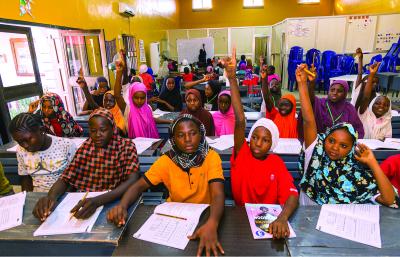
Rotarians working with the Adamawa Peace Initiative help run the Feed and Read program, which provides a hot meal along with lessons in English and math, and the Peace through Sports program.
After the news of the kidnapping broke in April 2014, a woman who worked for the university asked to see Ensign. She sat down in the president’s office and told Ensign that her sister had been one of 58 girls who had escaped that night by jumping out of Boko Haram’s trucks and running into the bush.
Ensign quickly began contacting those girls’ families to offer them a place at the university, which also houses a high school. In the end, 27 girls decided to come, and on 30 August – four months after the raid – Ensign prepared to head into the heart of the conflict to pick up the girls.
“We were going into dangerous territory,” says Lionel Rawlins, the university’s security chief. “We were going into Boko Haram’s backyard to snatch the girls. The morning before we left, we went to the police and said, ‘Are we ready?’ And they said, ‘We’re not going. It’s too dangerous up there.’ So I went back and told Margee we were on our own. We looked at each other, and I knew exactly what she was thinking. She said, ‘If you’re up to it, I’m up to it. Let’s go get the girls.’”
This wasn’t exactly what Ensign had imagined she would be doing when she arrived in Yola in 2010. An educator and administrator originally from California, she had come to run the American University of Nigeria (AUN), which had been founded in 2004 by Atiku Abubakar, a former vice president of Nigeria and a multimillionaire. Abubakar chose Yola because it’s in one of the country’s poorest, least developed states, with 80 percent unemployment, 75 percent illiteracy, and a “stunting” rate – due to chronic malnutrition – of 47 percent.
Ensign was intrigued by the job offer: Abubakar wanted AUN to be a development university that would transfer its knowledge to the poor areas around it, the way American land grant universities passed on agricultural knowledge to farmers.
“I hadn’t worked in West Africa,” she says. “It was a gigantic challenge: the complexity, the size, the scale of the country, the scale of the problems. But I kept thinking maybe this would be a chance to educate some of the future leaders of this very important country. Nigeria will be the third-largest country in the world by 2050.”
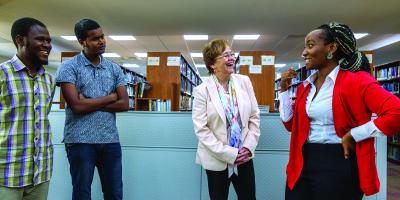
University President Margee Ensign, center, chats with students. “Every single person in Rwanda knows Margee because of her work. She’s part of our story,” says Mathilde Mukantabana, Rwandan ambassador to the United States.
Ensign had been researching and teaching about development issues long before she came to Nigeria. In 1993, she was teaching a class in Washington, D.C., when one of her students, Bonaventure Niyibizi, told her he needed to go home to Rwanda. He was worried his family would be killed. Ensign drove him to the airport and said goodbye, and four months later the genocide began: In 100 days, nearly a million people were killed by their neighbors.
For much of the world this was a distant, horrific news story. But for Ensign, it had names and faces. She couldn’t forget her students. In 1999, she flew to Arusha, Tanzania, to attend the United Nations’ International Criminal Tribunal for Rwanda. There, she learned that Niyibizi was alive and working with the Rwandan government.
For the next 10 years, as dean of the School of International Studies at the University of the Pacific in California, Ensign spent almost every summer in Rwanda working on development projects, including a committee to establish the University of Rwanda.
At the same time, she researched how the country had emerged from one of the worst tragedies of the 20th century to become a fast-growing, stable economy. Part of that process involved reconciliation between killers and families of those who had been killed.
“Every single person in Rwanda knows Margee because of her work,” says Mathilde Mukantabana, the Rwandan ambassador to the United States. “She was one of the first people to help us start organizing a conference on the genocide. She never quit. She was one of the people who – as an individual and on an institutional level – helped Rwanda to heal. She’s part of our story.”
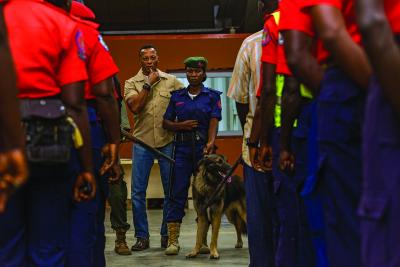
Lionel Rawlins, a criminology and counterterrorism expert, is a member of the America University of Nigeria chapter of the Yola Rotary Club and chief of security at the university. He oversees training and education for the university’s security staff.
When Ensign first arrived in Yola in 2010, it was the rainy season and everything was green. There was no indication of the heat to come, of the dust from the Sahara, or of the insurgency brewing in the north.
Shortly after arriving, she helped charter the AUN chapter of Rotary Club of Yola, which she knew would motivate university leaders to get involved in the community, and she implemented a required community development course for students.
She also called on an old colleague: Lionel Rawlins, a counterterrorism expert who had been born on the island of St. Kitts in the Caribbean and who was training troops in Iraq and Afghanistan at the time. He agreed to come to Yola to work with the university’s security staff, turning it into a more professional force, and to teach classes in criminology.
Then, in January 2012 – less than two years after Ensign took the job – the first crisis hit. The Nigerian government ended fuel subsidies, and protests broke out everywhere. “The whole country was rioting,” she says.
Ensign and Ahmed Joda, a prominent Muslim leader and chair of the university’s board of directors, met and said, “We’ve got to do something. We’ve got to build something in this community.” So they each invited people they knew to meet at the university. What started as a conversation grew into the Adamawa Peace Initiative (API).
Once we’d dealt with those first 5,000 we thought we’d solved it. ...Then by July it had gone from 5,000 to 20,000, and all of a sudden, in September, it was 10 times that.
Margee Ensign,
American University of Nigeria president and Rotarian
The group decided to focus on identifying and helping vulnerable youth. At that time, Yola had about 2,000 orphans and 40,000 almajiri, children who are sent away by their families to study the Koran. In Yola, those children often gathered outside the university gates to beg. They were potential targets for recruitment by terrorists.
The API’s first major program, called Peace through Sports, organized local boys and girls from different religious and ethnic groups into “unity teams” in which they played games and ate meals together. One boy told Ensign: “It was either this program or Boko Haram. There is nothing else here.”
Then, in spring 2014, a new challenge arose. People had begun fleeing from the north, where Boko Haram was attacking towns, burning homes, and enslaving girls. Ensign, Rawlins, and fellow Rotarian Abdullahi Bello drove to Mubi, a city about 120 miles northeast, to hear about the plight of hundreds of women and children who had fled the fighting.
Refugees began pouring into Yola. People who worked at AUN told stories about family members fleeing from the north after their villages were destroyed. One driver had 50 relatives living at his house.
By June 2014, there were 5,000 refugees in Yola. The university, the API, and the Rotary Club worked together to raise money to help the newcomers buy seeds to plant crops and pay their children’s school fees.
“Once we’d dealt with those first 5,000 we thought we’d solved it, because that’s a huge number of people,” Ensign says. “Then by July it had gone from 5,000 to 20,000, and all of a sudden, in September, it was 10 times that.”
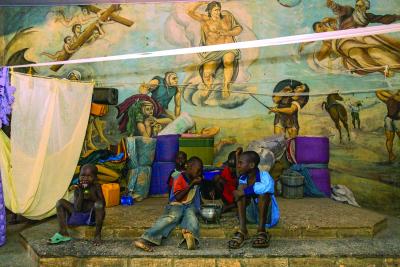
Children at a camp for internally displaced persons in Yola receive meals and other relief materials organized by Rotarians, the university, and the peace initiative.
The city was overwhelmed, but the government did nothing. Representatives of the international community hadn’t yet arrived on the scene. (And when they finally did, their response was “inadequate and incorrectly targeted,” according to a university report.) So Ensign and the others raised more money, which was funneled through the API, to buy food and supplies for the internally displaced people in and around Yola. They bought rice, beans, maize, cooking oil, blankets, sugar, salt, pasta, guinea corn, soap. They gave out petty cash for transportation. At the distribution points, tens of thousands of people lined up.
Meanwhile Boko Haram moved closer. In October 2014, the militants captured Mubi, and the river of refugees became a flood. By early 2015, an estimated 400,000 displaced people were living in Yola, and residents began to fear that Boko Haram would march all the way to the gates of the university.
“We had sleepless nights for weeks,” Rawlins says. “All the schools were closed down and everyone was running. But we stayed open.”
In a massive effort, the university, the API, and the Rotarians worked with Muslim, Christian, and other religious leaders to make sure no one starved.
“None of us had time to think about what we were doing,” Ensign says. “It was just: Raise the money, get the food, get it out, take care of these people. For six or seven months we had thousands of people in the streets and almost daily food distribution.”
With refugee crises going on around the world, Ensign says their experience has some lessons to offer. “In Yola, we took care of the same number of people as are refugees in some parts of Europe right now, where they say it’s impossible for these rich countries to take care of these refugees,” she says. “But we’re one of the poorest communities in the world, and we somehow figured it out.”
In November 2014, the Nigerian army retook Mubi and began pushing Boko Haram back to the north. Refugees started to leave Yola to return to their homes, but with everything burned and broken – hospitals, schools, banks, farms – it was going take a long time for normal life to resume, let alone for the wounds to heal.
We had sleepless nights for weeks. Everyone was running. But we stayed open.
Lionel Rawlins,
assistant vice president for safety and security, American University of Nigeria
To that end, the API expanded its goals to include reconciliation. “My experience in Rwanda tells me that rebuilding structures and rebuilding schools is important, but people have to figure out a way to deal with what happened,” Ensign says.
A year ago, she and others from the API drove to the city of Michika, which had been occupied by Boko Haram. They divided people into groups: young men, young women, rulers and traditional leaders, and vigilantes and hunters. They told their stories. They aired their grievances.
“At the beginning, the religious leaders said, ‘I have no problem with my Muslim friend,’ and ‘I have no problem with the bishop,’” Ensign says. “But if you probed a little deeper, they were furious with each other. We had an imam and a bishop who, by the end – I know this sounds silly – they hugged each other, which was a very important, very big public step.”
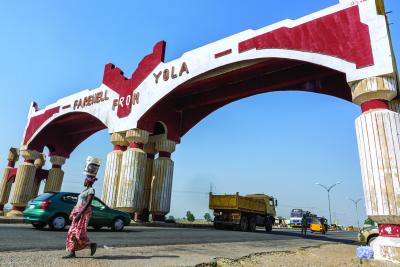
The gates of Yola, a city of about 400,000 that is home to the American University of Nigeria.
Today, back in Yola, the Chibok girls are carrying on. Two have gone home to marry and another dropped out, but 24 remain at AUN. (In October, 21 other girls were released by Boko Haram.)
Six of the girls at AUN are enrolled in the university proper, studying subjects like computer science, software engineering, and environmental science. “Education gives me the wings to fly, the power to fight, and the voice to speak,” says one of the students.
One night the girls came to Ensign’s house for dinner.
“What struck me was the amount of laughter,” she says. “They were just like young women anywhere. They had their phones. They were laughing. They’re always in each other’s arms. It was a very joyful evening.”
Yet the war and the problems it has created are never far away.
There are sporadic attacks and even suicide bombers in the marketplaces. And the refugees who have returned home have found even less than they had before: no crops growing, no seeds to plant, no food to eat. UNICEF is warning that 65,000 people are living in “famine-like conditions” and 4 million are facing severe food shortages.
The International Rescue Committee estimates that 5 million people need urgent food assistance. Ensign is afraid that it could become one of the largest famines in history.
So the university, the API, and the Rotarians continue to work to meet the community’s needs.
The Adamawa Peacemakers Initiative received a 2016 Tomorrow's Peacebuilders award from Peace Direct, a London-based organization that supports peacebuilders in conflict regions. API received a $10,000 award to be used in their program.
The Peace through Sports program has expanded to Mubi and several other towns and now does reconciliation work with about 5,000 young people.
In Yola, the university started a free eight-week course in information and communications technology and a youth program called Whiz Kids, which offers free classes in science, technology, engineering, and math.
More recently, AUN launched a USAID-funded project that uses a radio show and tablet computers to remotely teach 22,000 children to read, with apps written by AUN students in local languages.
Other programs have trained more than 1,000 women to make goods they can sell at market.
Most critical, however, is the Feed and Read program, which gives local children a hot meal along with lessons in English and math.
Today, 1,500 students are enrolled at AUN, up from 1,100 when Ensign took over nearly seven years ago. The school recently added a law degree, and an engineering program will start soon. After that, she envisions a medical school and a public health program.
“We had two presidents before Margee,” says Bello, who is the associate dean of students. “But she took the university to where it is right now, through her energy, her innovative ways, her community engagement projects. Margee has gotten us to realize that you can’t go forward if you’re thinking you’re going to go forward alone. We all need to go forward together if it’s going to work.”
• Read more stories from The Rotarian



